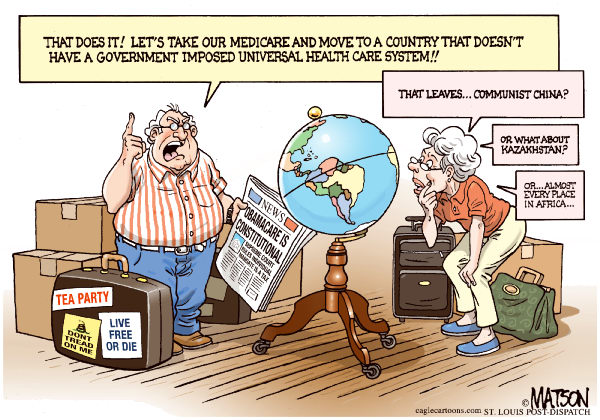Obamacare: Start All Over Again?
Rematch, Anyone?

In light of the recent Supreme Court decision upholding most of the Patient Protection and Affordable Care Act (“Obamacare”), the healthcare debate is now centered on: Should we start over again?
Speaker John Boehner says Republicans want to rip Obamacare out by its roots and start from scratch, replacing it with a “common-sense step-by-step approach.”
President Obama says we should not be refighting battles. Rather, we should work to improve our healthcare system and our healthcare laws based on the law as affirmed by the Supreme Court.

I agree with the President and, according to a recent Kaiser Family Foundation poll, 56% of respondents preferred that Obamacare opponents “stop their efforts to block the law and move on to other national problems.”
The Republicans base their arguments primarily on costs and burdens on business, claiming that the nation cannot afford Obamacare. Democrats point to the provisions of the Act that make healthcare more secure and expand coverage.
Both sides agree that things have to be done to lower the cost of healthcare in the United States, or at least slow its increase. The debate should focus on how.
The Centers for Medicare and Medicaid has projected that spending on medical services will rise to almost 20% of U.S. gross domestic product by 2021. Spending on hospital visits, medications, and other healthcare rose an estimated 3.9 % in 2011 and consumed almost 18% of GDP. The increases in such expenditures will continue to outpace economic growth projections, jumping an estimated 7.4 % in 2014, when much of the insurance expansion created by the health law begins.
On the other hand, a preliminary analysis by the non-partisan Congressional Budget Office found that repealing the Act would increase the federal budget deficits over the 2012–2019 period by a total of roughly $145 billion.
Since we are talking about health, the debate cannot be solely based on costs. If the Act were repealed, about 32 million nonelderly people expected to purchase insurance under the Act would not, leaving a total of about 54 million nonelderly people uninsured.
What is the value of increasing the nation’s health?
According to the World Health Organization (WHO), the United States spends more on healthcare per capita and more on healthcare as percentage of GDP than any other nation. While paying twice as much as other wealthy nations for healthcare, our life expectancy in the United States is 42nd in the world.
Provisions of Obamacare that promise to lower the price tag for healthcare and improve the overall health of the citizenry include:
* Limits on what percentage of premiums can be spent by insurance companies on salaries and other administrative expenses;
* Health insurance exchanges that pool small business;
* Distributing risk and increasing the size of the insured pool
* Reducing the expensive practice of using hospital emergency rooms to provide primary care to the uninsured;
* Electronic medical record reform;
* Preventative services to address illnesses before they become chronic; and
*Enhanced screening procedures to eliminate fraud and waste in the health care system.
As opponents of the Act have pointed out, the bill is over 2,700 pages long and many more pages than that of implementing regulations are sure to follow. This does not bother me, as healthcare is a complex subject. What I do want to hear from those who want to repeal the Act are specifics. What regulations are onerous? What provision of the Act needs to be changed and why?
As a self-employed person who must buy my own insurance–if I can afford it–I welcome the opportunity to join a pool of insurance buyers. As a citizen, I want the people I am sharing this society with to have access to quick identification and treatment of diseases, including communicable diseases.
I don’t want to start over again. Let’s improve the law we have.



